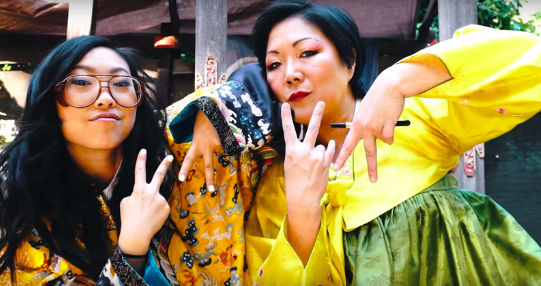
In the late 90s and early 2000s, Asian-American teens and young adults experienced a subculture called “AZN pride”. They made overt references to being “AZN” (a short form of “Asian”) in their usernames on AIM and dyed their hair to get conspicuous highlights, but perhaps one of the biggest emblems of AZN pride was their dedication to hip-hop. Hip-hop had already proven to be a powerful form of expression for the Black community, where the genre had originated. Messages of oppression and empowerment, along with the creation of a collective cultural identity, resonated with Asian-American youths around the country. From this desire to be heard, Asian-American rappers began to emerge. This was a time when young Asian-Americans could see themselves in MC Jin’s rap battles.
A lot has changed since AZN pride: Mom jeans are in fashion and we have an entertainment industry figure for a president. But what these two seemingly unrelated things have in common is that they’re second comings (mom jeans were originally trendy in the 70s and 80s, and the 40th president Ronald Reagan was an actor). And now, AZN pride is coming back, too, and in a big way, and here are three of the artists starring in AZN pride 2.0.

Like the original AZN pride icon MC Jin, Dumbfoundead has been rap battling (a duel format of rap that involves freestyling) for years, working up a following on YouTube. In 2016, he hit an unprecedented level of success when he went viral with the music video for his single “Safe.” In the music video, Dumbfoundead parodies several iconic moments from film and television (including the “I’m flying” scene from Titanic, the pottery scene from Ghost, and the intro of Full House) by superimposing his face onto white actors. The video criticizes the lack of Asians at the Oscars and in Hollywood in general. After his viral success, Dumbfoundead has continued to rap about his humble Koreatown roots and has collaborated with artists in Korea.
Dumbfoundead has worked with artists on this side of the Pacific, too. One of these is his co-star in Bad Rap, a documentary about Korean-American rappers, Awkwafina. She mostly creates comedy hip hop, and she often makes casual mention of her Korean and Chinese heritage, such as in the title track of her first album “Yellow Ranger” (named after the Asian Power Ranger) and in the single “Pockiez”. In 2016, Awkwafina teamed up with iconic Korean-American comedian Margaret Cho in the single “Green Tea”, a parody of reductive stereotypes about Asian women. You can also find Awkwafina on the silver screen: She recently acted in Ocean’s 8 and Crazy Rich Asians.

Please consider donating to The Michigan Daily
As another rapper-slash-actor, Wembley native Riz Ahmed has been making music under the name Riz MC since 2006, long before he starred in Venom and the Star Wars movie Rogue One. His first track “Post 9/11 Blues” was banned from British radio for having “politically sensitive” lyrics, a fact he later references in his song “Different” on his mixtape Englistan. Englistan is an autobiographical testament to being Pakistani in today’s England, symbolized by the combination of cricket shirts for the England and Pakistan teams in the music video for the title track and the album cover. In addition to his solo career, Riz MC contributed to the track “Immigrants (We Get the Job Done)” on the Hamilton Mixtape, a project remixing the hit Broadway musical Hamilton. Riz MC also joined American producer Redinho and Indian-American rapper Heems to form the Swet Shop Boys. Their debut album Cashmere addresses diverse issues; its first track “T5” is about the racial profiling of Muslims and brown men by airport security in the post-9/11 era.

Rejected by mainstream media, the first generation of Asian diaspora rappers made strides to craft an ethnic identity that could stand on its own. This separate identity united youth who felt at odds with both their parents’ culture and their country’s culture. However, as the presence of racial minorities increases both in population and on-screen, the role of Asian diaspora hip-hop musicians has shifted. The second generation of Asian diaspora rappers view their immigrant identities – and the struggles they face because of these identities – as their contribution to the larger cultures of the countries that they call home. With this vision in mind, the new AZN pride does not conflict with having an American (or in the case, of Riz MC, British) identity: it’s a part of it.
All of the artists and the music referenced in this piece can be found on iTunes and Spotify. You can also pick up a copy of Riz MC’s solo mixtape Englistan on Bandcamp (name your price).



